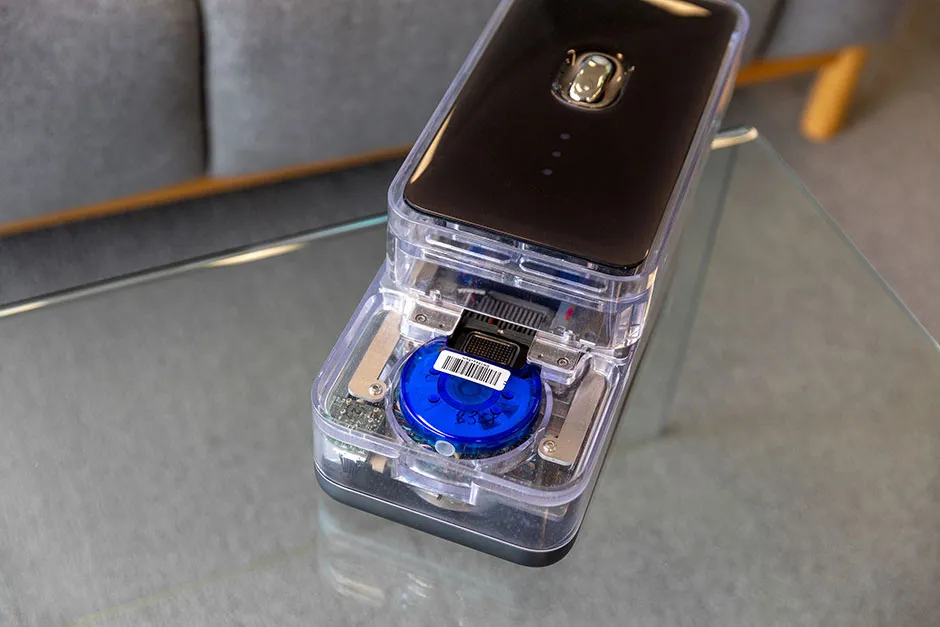A portable COVID-19 test which aims to diagnose the disease in 90 minutes could make a “huge difference” in hospitals ahead of the winter battle against the disease, according to the scientists.
The test, dubbed CovidNudge, has been shown to have over 94 per cent sensitivity (the ability to correctly identify positive cases) and 100 per cent specificity (the ability to correctly identify negative cases).
It was designed by DnaNudge, an Imperial College London spinout company, and can be performed by the patient’s bedside, without requiring the use of a laboratory.
The process involves collecting nasal and throat swabs from patients and placing them on to a cartridge which goes into a shoebox-sized machine known as NudgeBox for analysis.The device then looks for traces of genetic material belonging to the coronavirus.
Each machine has the ability to process up to 15 tests on the spot each day.
Read more about COVID-19 tests:
- New COVID-19 test gives results in just half an hour
- New coronavirus test 'highly specific and 100 per cent accurate'
Last month, the UK government placed a £161 million order for 5.8 million cartridges and 5,000 NudgeBox machines.
The test is being used across eight London hospitals and is expected to be rolled out at a national level.
Graham Cooke, professor of infectious diseases at Imperial College London, evaluated the results of the tests performed on 386 NHS staff and patients using CovidNudge.He described the CovidNudge testing kit as a “useful part of the whole puzzle for diagnostics”.
He said: “This [the test] is particularly well suited for clinical settings when you are trying to make a rapid decision for a patient. For example, we had a patient from last week who had a new diagnosis of COVID.
“We were able to get the diagnosis confirmed within two hours of arriving and start remdesivir and dexamethadone [drugs used to treat severe COVID-19] on that basis – much quicker than we would have been able to with confidence without that.”

The researchers are also making modifications to the device so the test can simultaneously assess other respiratory diseases alongside COVID-19, such as flu and respiratory syntactical virus.
Dr Bob Klaber, director of strategy, research and innovation at Imperial College Healthcare NHS Trust, said: “As an organisation we are focused on using research and innovation to continuously drive improvements to care.”
He added: “Getting accurate results back to clinicians and their patients as quickly as possible makes a huge difference to how we safely manage clinical pathways and we are very much looking forward to rolling this out more widely.”
Meanwhile, Professor Chris Toumazou, chief executive and co-founder of DnaNudge and founder of the Institute of Biomedical Engineering at Imperial, said that while the test offers “very significant potential” in terms of mass testing for COVID-19, further studied are needed to demonstrate “real-world effectiveness in non-clinical settings”.
He said: “The platform is well suited to testing in primary care and community settings with potential for use in non-healthcare settings such as care homes, schools, transport hubs, offices, and, to help bring the arts back, in theatres and venues.”
Read the latest coronavirus news:
- Heart disease: Patients dealt 'double blow' in pandemic, expert says
- Coronavirus: 2,000 patients to receive antibody therapy
- COVID-19 'highly likely' to become seasonal disease
While experts have described CovidNudge as promising development, one of the limitations is only a single sample can be analysed at a time – and may not be the answer to mass testing.
Paul Hunter, professor in medicine at University of East Anglia – who was not involved in the study, added: “Whether this new technology would be of value on the UK government’s Moonshot testing strategy is uncertain.
“The big worry is with use of any testing in asymptomatic individuals, a reported feature of this strategy. Any testing of asymptomatic individuals is likely to yield very low numbers of true positives, probably less than one in 10,000 tests.
“When the true incidence is so low then even a small number of false positives from a test could mean that the majority of positive results are false. We would need to see much larger evaluation studies to get a better understanding of the real specificity.”
How can I protect myself from the coronavirus when shopping?
You’ll have seen signs in your local supermarket advising you to keep two metres from others while moving around the store. This is key to reducing your chances of catching the virus while shopping.
The coronavirus SARS-CoV-2 is spread through respiratory droplets that leave our mouth and nose when we cough, sneeze, or sometimes even talk. The droplets sprayed out by an infected person will contain the virus, which could then enter your body via your mouth, nose or eyes (this is why you shouldn’t be touching your face).
Respiratory droplets don’t usually travel more than one metre, so by keeping two metres from others, you’ll reduce the likelihood of being in the firing line. To make it easier to keep your distance, try to shop during off-peak hours, choose a store that’s limiting the number of people who can be inside at any one time, and use self-checkout if you can.
Keeping your hands clean is the other main thing you can do. If possible, wipe the trolley or basket handles with a disinfectant wipe when you arrive at the store. When you get home, wash your hands or use hand sanitiser before and after unpacking your bags.
A US study found that the coronavirus can survive for up to 24 hours on cardboard, and up to three days on hard, shiny surfaces such as plastic, so wiping down your purchases with a disinfectant spray or a soapy cloth before you put them away is another good habit to get into.
Read more: